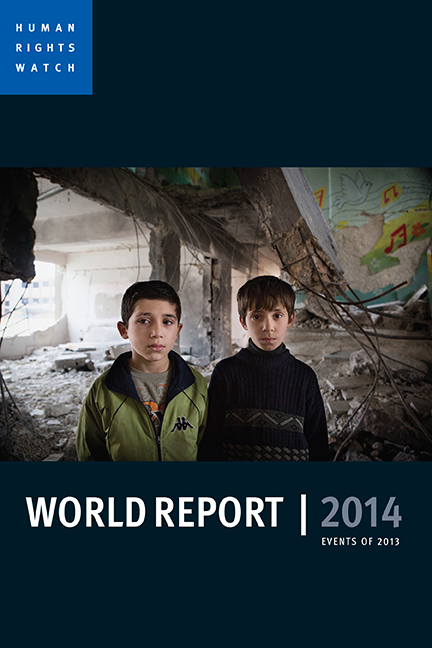Book contents
- Frontmatter
- Dedication
- HUMAN RIGHTS WATCH
- Table of Contents
- Foreword
- Rights Struggles of 2013: Stopping Mass Atrocities, Majority Bullying, and Abusive Counterterrorism
- The Human Rights Case for Drug Reform How Drug Criminalization Destroys Lives, Feeds Abuses, and Subverts the Rule of Law
- Putting Development to Rights: Integrating Rights into a Post-2015 Agenda
- The Right Whose Time Has Come (Again) Privacy in the Age of Surveillance
- Photo Essays
- AFRICA
- AMERICAS
- ASIA
- EUROPE AND CENTRAL ASIA
- MIDDLE EAST AND NORTH AFRICA
- UNITED STATES AND CANADA
- 2013 HUMAN RIGHTS WATCH PUBLICATIONS
- Acknowledgments
- Frontmatter
- Dedication
- HUMAN RIGHTS WATCH
- Table of Contents
- Foreword
- Rights Struggles of 2013: Stopping Mass Atrocities, Majority Bullying, and Abusive Counterterrorism
- The Human Rights Case for Drug Reform How Drug Criminalization Destroys Lives, Feeds Abuses, and Subverts the Rule of Law
- Putting Development to Rights: Integrating Rights into a Post-2015 Agenda
- The Right Whose Time Has Come (Again) Privacy in the Age of Surveillance
- Photo Essays
- AFRICA
- AMERICAS
- ASIA
- EUROPE AND CENTRAL ASIA
- MIDDLE EAST AND NORTH AFRICA
- UNITED STATES AND CANADA
- 2013 HUMAN RIGHTS WATCH PUBLICATIONS
- Acknowledgments
Summary
After 27 years in office, President Yoweri Museveni's government increasingly suppresses freedom of assembly, expression, and association while escalating threats to civil society. Two media houses faced temporary closure in 2013 for publishing articles suggesting that Museveni is grooming his son to take over the presidency. Debate around presidential succession, accountability of public resources, governance, and other politically sensitive topics is increasingly constrained. Activists who provide public information about government expenditure and corruption are obstructed from demonstrating and sometimes face criminal charges such as inciting violence, while opposition politicians are regularly prevented from holding public rallies.
Freedom of Assembly and Expression
After two years of sporadic debate, Parliament passed the Public Order Management bill in August 2013 and the president assented shortly after, further restricting space for dissent and public critiques of governance. The controversial bill was considerably amended just before passage, but it remains vague, making it open to abusive application. The law still grants police wide discretionary powers to permit or disallow public meetings.
Throughout the year opposition politicians faced arrest, detention, and criminal charges for holding public assemblies in Uganda. In July, seven opposition politicians were charged in a Kampala court for belonging to and managing an “unlawful society,” Activists for Change (A4C), a political pressure group the government had banned in 2012 on spurious grounds. Earlier, in February, 15 people, including the mayor of Kampala and then-opposition leader Kizza Besigye, were charged with organizing an unlawful assembly. Both cases were pending at time of writing.
The government continues to be hostile to independent media publishing politically sensitive articles. On May 7, the Daily Monitor newspaper detailed an alleged conspiracy to frame or eliminate high-ranking members of the government who do not support the plan for Museveni's son to take over when his father steps down. On May 20, more than 50 uniformed police sealed off the Daily Monitor's premises after it published a letter allegedly written by Uganda's coordinator of intelligence service, Gen. David Sejjusa. Two radio stations located in the same compound were also forced off air by the Uganda Communications Commission. The same day, police closed the Red Pepper, another newspaper, on similar grounds.
- Type
- Chapter
- Information
- World Report 2014Events of 2013, pp. 187 - 192Publisher: Bristol University PressPrint publication year: 2014

